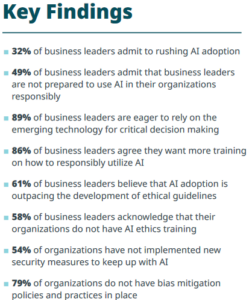As U.S. business leaders across industries increasingly rely on artificial intelligence (AI) for critical decision-making, gaps in literacy, ethical usage and organizational preparedness remain notable concerns, according to global master data management provider Stibo Systems.
The firm’s latest report, “AI: The High-Stakes Gamble for Enterprises”, surveyed over 500 U.S. business leaders (director-level and above) across multiple sectors, including retail, consumer packaged goods (CPG), manufacturing, banking, and insurance and life sciences.
The survey found that 32 percent of business leaders admit they have rushed AI adoption, while 58 percent acknowledge a lack of AI ethics training.

AI: The High-Stakes
Gamble for Enterprises report
Additionally, 86 percent express a desire for more training on how to responsibly use AI.
Preparedness concerns sparked 49 percent of business leaders to admit they are not prepared to use AI responsibly, highlighting the substantial gap in readiness.
“Despite a lack of preparedness and training, AI is becoming increasingly integrated within high-stakes decision making at organizations”, the report stated.
The top five business decisions respondents use AI for include:
- Risk Management 41 percent
- Operations 40 percent
- Strategic Planning 38 percent
- Product Development 35 percent
- Customer Relationship Management 34 percent
The lack of bias mitigation policies remains an issue, with 79 percent of organizations admitting they do not have bias mitigation policies and practices in place, indicating that most business leaders are not addressing AI’s most critical ethical challenges.
“AI is transforming business operations by automating processes, delivering actionable insights, and fostering stronger engagement with key stakeholders,” said Gustavo Amorim, chief marketing officer, at Stibo Systems. “However, if business leaders go all in on AI without establishing strong ethical and governance frameworks, they may be gambling away with their organization’s future, rather than positioning it for long-term success.”
While business leaders continue to bluff their way through AI adoption, the negative consequences remain on their minds.
“According to leaders, the top challenges of AI that keep them up at night or make them feel stressed are data privacy concerns, ethical dilemmas, and reputation or brand damage,” the report noted.
New security measures to keep up with AI integration have not been implemented by 54 percent of the responding organizations.
The report suggests that organizations can take several steps to effectively manage AI-generated data, from implementing new security or privacy procedures to greater investments in infrastructure.
“Responsible AI practices involve providing AI training to employees and senior leaders, setting up data quality assurance procedures, and revising data security and privacy policies,” the report added.
“Establishing trustworthy data sources, enforcing robust security and ethical policies, and providing comprehensive AI literacy and bias training are essential steps to protect employees, customers, and brand reputation,” said Amorim. “Without these measures, organizations are rolling the dice, risking financial and reputational damage instead of capitalizing on the innovation and synergies AI can deliver.”





















 Preparing for an AI Native Future
Preparing for an AI Native Future  Allianz Built an AI Agent to Train Claims Professionals in Virtual Reality
Allianz Built an AI Agent to Train Claims Professionals in Virtual Reality  What Analysts Are Saying About the 2026 P/C Insurance Market
What Analysts Are Saying About the 2026 P/C Insurance Market  Flood Risk Misconceptions Drive Underinsurance: Chubb
Flood Risk Misconceptions Drive Underinsurance: Chubb 